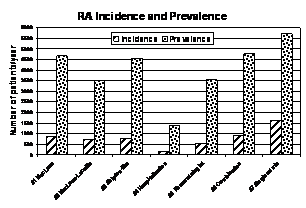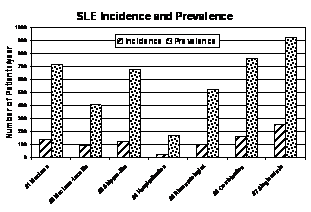Session Information
Session Type: Abstract Submissions (ACR)
Background/Purpose: To compare the incidence and prevalence of rheumatoid arthritis (RA) and systemic lupus erythematosus (SLE) in administrative databases using different diagnostic decision rules.
Methods: A retrospective cohort study was performed using administrative health care data from a population of 1 million people with access to universal healthcare. Information was available on hospital discharges and physician billings over a 13 year period. Each RA and SLE case was matched 4:1 by age and gender to randomly selected controls. Seven decision rules, validated against the diagnosis confirmed by a rheumatologist, were used to identify RA and SLE cases and to examine the incidence and prevalence of both diseases.
Results: The overall accuracy of the decision rules for RA cases varied between 68.9-82.9% with a kappa statistic between 0.26-0.53. The sensitivity varied from 20.7-94.8% and the specificity between 62.5-98.5%. For SLE the overall accuracy of the decision rules varied between 88.2-95.6% with a kappa statistic between 0.53-0.86. The sensitivity varied from 41.0-86.6% and the specificity between 92.4-99.9%. The number of incident cases per year was between 176-1610 (0.02 – 0.17% population) for RA and between 29-255 (0.003 – 0.027% population) for SLE. The number of prevalent cases per year was between 1384-5722 (0.15 – 0.61% population) for RA and between 172-920 for SLE (0.018 – 0.098% population).
Conclusion: The performance of decision rules for the identification of incident and prevalent RA and SLE cases in administrative healthcare databases is variable and should be considered when compareing results across studies.
Disclosure:
J. G. Hanly,
None;
K. Thompson,
None;
C. Skedgel,
None.
« Back to 2013 ACR/ARHP Annual Meeting
ACR Meeting Abstracts - https://acrabstracts.org/abstract/the-impact-of-diagnostic-decision-rules-used-in-administrative-healthcare-databases-on-the-frequency-of-rheumatoid-arthritis-and-systemic-lupus-erythematosus/


